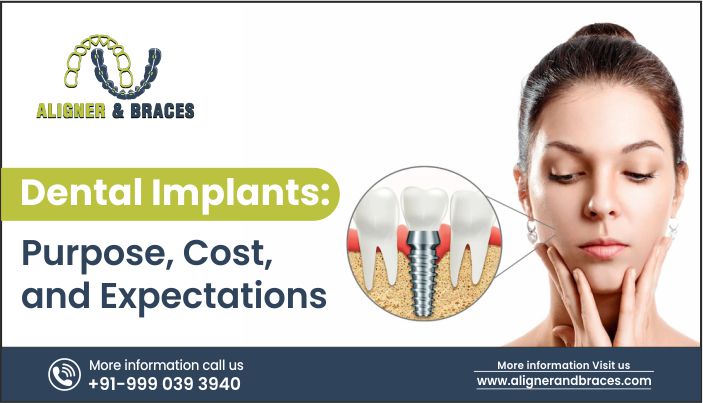Gaps caused by missing teeth are more than just an unpleasant aesthetic concern. Missing teeth create several issues, ranging from tooth shifting to bone resorption and gum disease. It is critical to replace the tooth to avoid severe dental complications.
We will discuss the purpose, cost, and expectations of dental implants as permanent tooth replacements in this section.
What are dental implants?
Dental implants are posts that replace the tooth root in the jaw bone. Once repaired, it provides a stable base for dental treatments such as a dental bridge, crown, or denture.
Individual teeth are replaced with single dental implants. Crowns are placed on top of them to resemble the shape of natural teeth. Approximately four to six implants are set and fitted with a denture to replace a complete arch of teeth.
What are the hazards of missing teeth?
The absence of a tooth causes much more than just a gap in your smiling face. It can have a negative impact on your entire health. Usually, we all lose our baby, or deciduous, teeth when our adult teeth develop. This has no consequences; nevertheless, missing an adult tooth can cause a wide range of dental and systemic health difficulties.
One of the most concerning effects of tooth loss is the weakening of the jawbone. The jawbone will start to resorb if it isn’t stimulated to grow by teeth. This will cause your chin to extend upward and forward over time. A lost tooth may also affect your self-confidence, causing you to smile very little.
How can dental implants help?
A dental implant is required to avoid these problems if you are missing a tooth. Dental implants, which are composed of a titanium alloy, can promote jawbone development while also preventing additional jaw degeneration.
Furthermore, when your dental implant is done, the titanium alloy will adhere to the jawbone through a process called osseointegration. The bone around the implant will develop, resulting in a strong replacement for your missing tooth.
After the dental implant has been completed, you may have to wait approximately six months for the crown and abutment to be placed. When this is completed, you will get a replacement tooth that feels and looks the same as your natural teeth.
Instead of fitting a crown on your abutment with an implant if you have lost all or a significant portion of your teeth, doctors can place the ball and socket device on them for implant-supported dentures. This is considerably superior to conventional dentures that lie on your gums. In addition to fitting better, implant-supported dentures also cause less discomfort than conventional dentures.
Who is a good candidate for dental implants?
Dental implants can only be a suitable tooth replacement procedure if you have a healthy, strong jawbone and gums. Dental implants may not be appropriate if you have had bone loss as a result of a tooth infection or if you suffer from oral health issues such as gingivitis.
Patients will need to have x-rays taken to examine the bone strength below the gum line since dental implants need appropriate bone structure to be placed. This is required to enable effective osseointegration, which occurs when the bone in the jaw develops and folds around the implant to secure it in place.
Dental implant candidates are encouraged to get in touch with the dental medical team for a consultation. This is an effective way for the dentist to evaluate the smile and its specific demands in terms of tooth replacement.
Bone grafting for tooth implants
Your dentist may advise bone grafting as a treatment to restore your jaw and require dental implants if you have experienced bone loss. However, it is essential to understand that the bone grafting treatment takes many weeks to recover from, and dental implants cannot be placed until the recovery phase is complete.
A surgeon will take a piece of bone from another region of your body (or use a special bone grafting substance) and graft it onto your present jawbone. This procedure aids in strengthening the jaw and creates a strong foundation for dental implants.
What is the cost of dental implants?
The overall cost varies according to the mouth area, location, number of implants, and form of restoration or crown. A fee is charged if extra treatments are required to prepare your mouth for implants. These treatments may include bone grafts or tooth extractions. Bone grafts are required for people who do not possess enough healthy jaw bones to secure the implant.
How long do dental implants last?
Patients now have a permanent option for tooth replacement with dental implants, which can last a lifetime. Implants can last a lifetime with adequate maintenance, including proper oral hygiene and routine dental checkups. They do not cause damage and have a high percentage of success.
However, although the dental implants may be permanent, daily use can cause the attached crown to degenerate. The crown may have to be changed after 15–20 years.
What can you expect from dental implants?
Depending on the type of anaesthesia you got for your dental implant procedure, you may feel foggy and “out of it” after the treatment. A few hours after receiving your dental implants, the local anaesthetic will begin to wear off.
Like any other surgical procedure, you can expect adverse effects following your dental implant procedure. These may include minor bruising, swelling around the face and gums, and some discomfort and pain at the implant placement area. Your dentist will recommend medications that will help you address any post-surgery health problems.
After a dental implant procedure, you may require antibiotics or painkillers. Contact your dental surgeon if discomfort, swelling, or any other issue worsens in the days after the dental implant procedure. You may need to consume soft foods after every phase of treatment to allow the surgical area to heal.
On the first day after the dental implant, you should limit your activity and take plenty of rest. Depending on how complex your treatment was, you can usually go back to work after that. Your doctor can help you determine when you are ready to resume your everyday activities.


Dr. Varun Grover is very senior orthodontist hence I chose him for my Invisalign treatment. He guided me really well throughout the treatment. I love my new smile. Thank you sir I am really grateful to you.